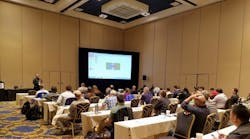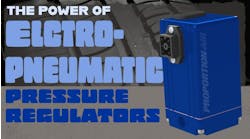Introduction to Hydraulics—the first of four college-level courses offered at the International Fluid Power Expo (IFPE)—drew a diverse crowd of students ranging from sales managers to mechanics. But what they all had in common was a similar goal to learn more about hydraulic systems used in heavy-duty mobile and industrial machinery.
The course set the stage for the next four days at CONEXPO/CON-AGG, where hundreds of mobile machines used in construction and agriculture will be on display at the Las Vegas Convention Center, along with heavy-duty power transmission systems and fluid power solutions at IFPE. The information from the course could be used to help attendees learn more from presentations at both shows, and prepare them for meaningful conversations with hydraulic-solution suppliers and engineers in the South Hall at IFPE.
The course was taught by Dr. Khalil Medhat from the Milwaukee School of Engineering. It started at 8 a.m. and ended a little after noon in the Westgate Casino and Resort, one Monorail stop away from the Las Vegas Convention Center. The course began with a quick comparison between mobile hydraulic machines and industrial hydraulic machines, which tend to be tethered to one location. It introduced hydraulics’ role in high pressure systems, and iterated the course’s focus on hydrostatic, closed-loop hydraulic systems for mobile machines.The class discussed simple physics and equations to show how hydraulics can control the speed and force of actuators.
It also touched on the inefficiencies of hydraulic systems, and how fluid properties like viscosity can affect the Reynolds number in addition to system properties like orifice diameter, transitions between flow paths, friction, and flow speed. Dr. Khalil mentioned that more viscous fluids would see a higher head loss in tubing due to friction at the boundary layer. Spectroline International Sales Manager Matthew Roesser and Sales Account Manager and NFPA member Jeffrey Levine discussed how this portion of the course could help them better serve their customers that use Spectrolite, an fluid additive for leak detection.
“Our customers always ask if our additive will affect their system and fluid properties, and we have to prove to them why they do not,” says Roesser. “Now I understand their concerns surrounding increased friction in their system due to changes in fluid properties, and can assure them that the additive will not lead to higher pressure losses.” Spectronic engineers also attended the next class, Fluids and Impurities, and another course offered the following day.
Mike Pickart, a mechanic at Hollow Contracting, also joined the course. “I learn about hydraulic pumps and motors mostly by taking them apart and rebuilding them. During the class, I could relate topics—like the different types of pumps and their applications, and the flow of oil through parts like the pressure relief valve—to the projects we work on. In one vehicle I’m working on, the pressure relief valves have a history of burning up the hydraulic pumps. Now I understand how to set them up in the circuit so they won’t.” Pickart also expects to look into the resources offered by Dr. Khalil after the course so that he can learn more about hydraulic systems and components and apply the knowledge to his work.
Dr. Khalil’s website is www.compudraulic.com, and his books, Introduction to Hydraulics for Industry Professionals Volume 1 and 2 can be purchased with the promo code, IFPE 2017. He expects to release Volume 3 this year.


